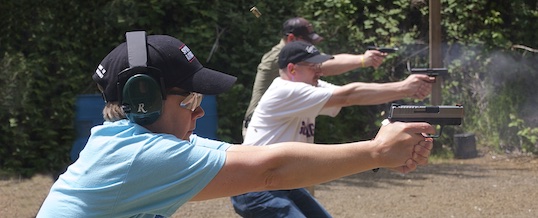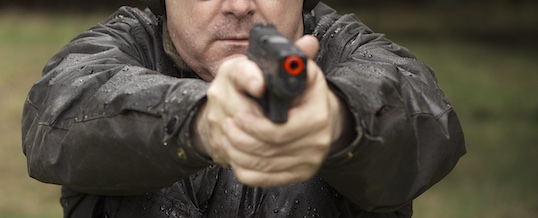
You don’t need to be a SEAL to defend yourself with a firearm. You need more relevant skills.
Last week I got two emails about my front page headline: “You don’t need to be a Navy SEAL just to be safe!” One applauded me for “telling it like it is”, but the other one insisted that I was doing people a big disservice by saying that, because if everyone trained to the level of a SEAL they’d definitely be safer. “It’s a matter of priorities”, the writer concluded.
Sorry, but I really don’t think so.
I believe those of us in the private sector world, the civilian world, need to look at our use of a firearm very differently than does someone in the military (or even someone in police service.) The threats we face are usually a surprise; we typically don’t have advance notice that we’re going to be attacked (or that we’re going to attack someone!) ahead of time. Our attackers very often are motivated differently than the bad guys on the battlefield, and we can’t carry the kind and quantity of equipment we’d need to deal with every possible eventuality. Finally, as I’ve said many times before, we don’t have unlimited dedicated time, budgets and energy to train with all that stuff even if we did have it.
So how do we, as prepared citizens, approach this big subject of self defense — which includes defense of our family and loved ones? How do we decide what skills and equipment and training we need, without either over- or under-preparing? What is the “Goldilocks Point” — where everything is just right?
A different look at the fabled Triad
Back in the 1980s, famed shooting instructor Jeff Cooper proposed what he called the “Combat Triad”: a very military-inspired trio combining marksmanship, gun handling and what he termed the “combat mindset”. He wrote and taught extensively about those topics, and while they’re interesting from a historical perspective I don’t think they’re really appropriate for the task of self defense in the private sector. I believe that those of us who aren’t former Marines, as Cooper was, and who don’t actually live on a shooting range (as Cooper did) need to consider a different trio — the Defensive Shooting Triad.
Resolve: the decision, made ahead of time, that your life (and those of your loved ones) is worth protecting and that you will commit to doing whatever is necessary to protect it. This is sometimes lumped in with “mindset”, but I believe mindset to simply be the natural progression of Resolve. As Massad Ayoob has famously pointed out, the gun is not what criminals fear — it is the resolute person holding that gun which he fears. Resolve is what gives you the inner strength you need to do what’s necessary to protect yourself, and at the same time is what the criminal sees in you. Resolve is not something that you can learn in a class nor from listening to a lecture; you come to this belief on your own. You need to deeply consider what your life means to you and the people around you, and realize that no one has the right to threaten it or attempt to take it from you. If you’re a religious person it may entail coming to grips with what your faith says about using potentially lethal force to protect your life or the lives of other innocents.
Legal Knowledge: our society has guidelines for what and how people interact with each other, to include what is acceptable in self defense. In virtually all cases a truly unwarranted attack on your life justifies the use of lethal force on your part, but what if there was interaction prior to that threat? What about cases where you’re protecting another person? What if your actions escalate an encounter? The actual application of defensive skills and tools is subject to a well-established (if not always well understood) legal framework, and understanding that framework ahead of time is critical to making good decisions. This legal knowledge shouldn’t be construed as guiding you in the split-second decisions you make when faced with an obvious and immediate lethal threat, but rather prevents you from making critical errors in judgement in less clear or more protracted incidents. It also guides how you behave generally when carrying a lethal tool, because you’ll be held to a different and higher standard of comportment than someone who doesn’t.
Defensive Shooting Skills: this is the area most of us tend to focus on, but in reality the skills used in self defense incidents aren’t as esoteric or as high-level as some would have you believe. You need to be able to retrieve your gun from wherever it’s stored and place rapid, multiple, accurate shots into a center-chest area as fast as you can get the hits out to any plausible self defense distance. That’s not really a tall order; that happens in about the first three hours in any of my classes, even with brand-new shooters. Beyond that it’s reasonable to expand your skills to encompass shooting to greater levels of precision that you might encounter; being able to make decisions before and while shooting; being able to draw your gun, reload and clear malfunctions while moving off the line of attack; and perhaps learning to draw from unconventional positions (like when seated.) Some people won’t believe this, but that’s not a huge amount of training; from then on it’s really a matter of practicing to keep those skills fresh. Frankly, if it’s a choice between training more techniques or simply practicing those you have, I’ll suggest picking the latter almost every time!
No, I don’t believe you need to be a Navy SEAL or even train like one to defend yourself and your family. I do think you need an understanding of what skills you’ll really use, the knowledge of when you can and can’t use them, and the determination to use those skills when appropriate to defend yourself and your family.
How much of the Defensive Shooting Triad have you mastered?
– Grant Cunningham
- Posted by Grant Cunningham
- On March 7, 2016



